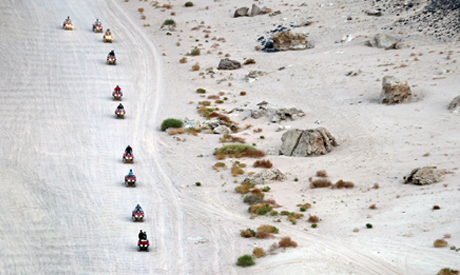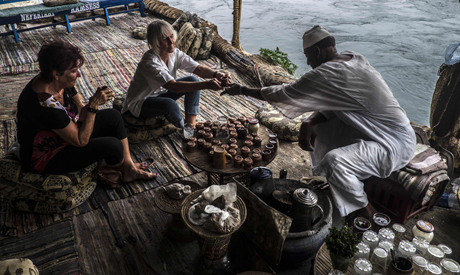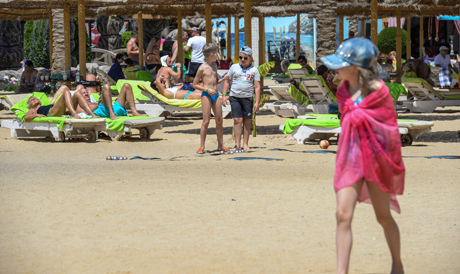As official statements indicated a growth in tourist numbers and tourism revenues after the previous suspension of foreign flights ended and foreign travel agencies resumed their trips to key tourist areas including Sharm El-Sheikh, digital and ecotourism have now also surfaced as ways of promoting the industry in Egypt, along with other products such as cultural, health, and sports tourism.
A new report by the Central Bank of Egypt (CBE) indicates a $2.7 billion rise in Egypt’s tourism revenues to reach $12.57 billion in 2018-19 compared to $9.804 billion in 2017-18. The same report shows that the tourism sector helped to produce a $1.7 billion increase in the balance of payments during the second half of the last fiscal year, reducing the total deficit of the first half of the same year. Travel payments rose to $2.9 billion by the end of June 2019, compared to $2.45 billion during the same period last year.
Jordi Caballé, secretary-general of MedCruise, the Association of Mediterranean and Adjoining Sea Cruise Ports, said in a speech at the eighth Mediterranean Tourism Forum held in Alexandria last July that the number of world cruises had increased to more than 12,000 in 2017. The number of tourists taking cruises had reached 28 million around the world in 2018 for the first time, while cruise tourism was expected to flourish further, attracting more than 30 million tourists worldwide by the end of 2019, Caballé said.
He added that “the association, which has 37 members on its board, is keen on organising cruises in the Mediterranean region that start from Portugal and head to the Red Sea.” The Mediterranean ranks as the world’s second most-popular cruise destination, hosting 17.3 per cent of all global trips. The Caribbean is the top cruise destination, attracting more than 34 per cent of all cruises worldwide.
Caballé speculated that the period between 2019 and 2027 would witness a further boom in the cruise industry. Building 122 more ships would increase cruise ships by 29 per cent and likely yield a 65 per cent rise in the cruise tourism market, he said. “Further steps will also be needed to promote cruise tourism, including the building of more ships as well as revisiting the conventions and laws governing the industry,” Caballé added.
However, despite this good news for Egypt there are still challenges standing in the way of promoting tourism in the country, according to former minister of tourism Hisham Zazou.
Whereas the Mediterranean attracts at least 50 per cent of global tourism, some of those who work in the field still lack the proper training and expertise needed to revive the sector in Egypt. Zazou said that programmes should be designed to boost digital platforms that would help market tourist sites in Egypt.
Egypt aims to attract 12 million tourists in 2019-2020, an 11 per cent increase over last year. The government also aims to increase the number of tourism nights spent in the country to 127 million during 2019-2020, compared to 113 million nights the previous year.
The depreciation of the pound against the dollar in 2016 resulted in the growth of the country’s tourism sector, with the number of tourists surging by 47 per cent compared to the previous year to take advantage of the more competitive prices. The Africa Cup of Nations football tournament held in Egypt last summer also increased the number of African tourists coming from 23 countries to attend the matches.
According to the Ministry of Tourism, the occupancy rate of hotels in the governorates that hosted the tournament exceeded 80 per cent of all available rooms.

Travellers going on a safari trip in Sinai
Digital tourism
According to economist Ahmed Khattab, a member of the Egyptian Businessmen Association, “digital tourism relies on the Internet for e-booking, marketing, and advertising as key tools that help the tourist sector keep pace with global developments and ultimately help the growth of the Egyptian economy.”
He added that Egypt had recently witnessed a remarkable growth in the tourism sector. “This year has witnessed a 27 per cent increase in the number of tourists as compared to last year, especially those coming from France, Italy, Germany, Greece and Cyprus,” Khattab said.
Digital tourism, he added, had greatly contributed to the 30 per cent increase in the revenues of the tourism sector this year. He cited the website EgyGate as a case in point, saying that it was now one of Egypt’s most prominent digital platforms that has been promoting the country’s tourist sites and attractions, including Egypt’s new Grand Egyptian Museum (GEM) that will be opened soon.
The recovery of tourism in Egypt has attracted foreign investments in the field, and it has encouraged the establishment of new hotels and tourist villages as well as inflows of foreign currency. It has done a lot to re-establish Egypt on the international tourist map, Khattab commented.
He said that officials in the field of tourism had been focusing on improving hotels and conference tourism, both reflecting positively on the industry. “Digital tourism has facilitated reservations through websites and foreign travel agencies,” Khattab elaborated. “These digital platforms also introduce tourists to Egypt’s archaeological sites and other attractions like Luxor, Aswan, Sharm El-Sheikh, Siwa and Hurghada, as well as helping them to locate souvenir shops.”
“Such online publicity and facilities reduce travel costs, encouraging more tourists to visit Egypt. Egypt is already considered a very good-value travel destination compared to neighbouring countries, which should also help revive tourism in the country,” Khattab said.
Beach tourism in the Red Sea and the Mediterranean accounts for 82 per cent of all tourists visiting Egypt, according to Hisham Gabr, a member of the Egyptian Tourism Federation. Hisham said that the federation had been training some 85,000 workers in the tourism sector on how properly to maintain tourism resources and welcome foreign tourists.
An important part of this training had been in ecotourism, according to Hisham. “Workers have been trained on how to get rid of plastic bags and preserve coral reefs,” he explained.
The federation has also launched a Green Star Hotel Programme that sets criteria and provides guidelines for hotels seeking to be recognised as environmentally friendly. Those hotels should adhere to a set of environmental guidelines, among them the use of clean and renewable energy, according to Hisham. The programme aims at making all hotels environmentally friendly by the year 2030.
The programme was launched by the ministry of tourism as part of its reforms to develop the industry. The ministry said in a statement that “Egypt adopts the UN concept of sustainable development through its structural reform programme, which gives top priority to green tourism and upgrading hotels and tourist facilities in a way that saves energy and conserves the environment. Hotels that comply with the guidelines set by the Green Star Hotel Programme are credited with a local Green Star Certificate indicating that they meet the international standards of sustainability set out by the Global Sustainable Tourism Council [GSTC].”
According to the ministry, eco-friendly hotels use clean and renewable energy to preserve the environment, provide facilities for the disabled and elderly, have large green areas to reduce air pollution, use eco-friendly detergents in laundry and dishwashers, use updated irrigation methods that reduce water consumption, reduce solid-waste disposal, use recycled water to cultivate green spaces, and employ updated management techniques conforming to international guidelines for waste and sewage management.
“Today, 80 hotels with 22,000 rooms have received the certificate nationwide,” the ministry announced. It added that the number of eco-friendly hotels would increase in the light of cooperation between the ministry and the Chamber of Tourism Establishments, which have been working together to “set up standards for hotel clusters in so-called ‘green destinations’ to meet demand for this type of tourism and enhance its presence in Egypt.”

Tourists relishing a Nile-side Nubian tea treat in Aswan
Ecotourism and e-marketing
Ahmed Yehia, head of the Eco-Nubia Lodge organisation in Upper Egypt, said his project had been working on turning hotels and tourist facilities into eco-friendly lodges, as well as on increasing awareness of Egypt’s rehabilitated heritage and other treasures.
The first Eco-Nubia Lodge was established on Bigeh Island, a largely neglected archaeological site stretching along the Nile River in Nubia within the Aswan governorate of Upper Egypt. The Island is situated in the reservoir of the Old Aswan Dam, and the Lodge was built using eco-friendly materials including clay and palm leaves.
Yehia explained that managing wastewater could be challenging in establishing such eco-friendly lodges. “We had to build a network of sewage pipes to separate solid and liquid waste,” Yehia elaborated. “Solid waste was recycled and used in the production of biogas, while water was reused in agriculture. We focused on cultivating lotus and papyrus in order to provide the raw materials necessary for traditional handicrafts, thus generating income for the Island’s inhabitants. We have a 10-year lease on the Island, after which the Island will return to its inhabitants.”
E-marketing expert Fadi Ramzi said that this was now more important than ever in boosting tourism in the digital era, “which is witnessing unprecedented growth in the number of Internet users and those browsing the web for bookings and information.”
He added that there were three stages travellers use when looking at the Internet for such information. First, “travellers usually browse the Internet to survey destinations, read reviews about those destinations, and hunt for the best offers and most attractive sites.” Then, they resort to e-booking for air tickets and accommodation and tours and continue to look for sites, shops and restaurants even after they arrive at their destination. Third, they tend to share photographs and videos of their trips on social media, write stories about their visits on blogs, and send reviews to the websites of the hotels and tourist agencies that hosted them.
“Those reviews and blogs are important for marketing purposes, and they are part of an integrated system of many channels that involves more than one e-gate,” Ramzi explained. “The websites of the hotels and tourist agencies, blogs, social-media networks, especially Facebook, Instagram and Twitter, search-engine optimisation, and mobile marketing are all key factors in boosting tourism.”
Yet, the lack of expertise and of a professional in-depth strategy for e-marketing in Egypt remains a major challenge, according to Ramzi. “The very concept of destination-branding and destination-marketing is missing,” he lamented.
Tourism expert and professor at Alexandria University Ehab Hamdi also underscored the importance of travel media.
“There is a difference between travel advertising and travel media,” Hamdi said. “Advertising is a marketing tool that aims to attract more tourists, whereas travel media is more of a service providing curious travellers inside and outside the country with comprehensive media content on everything they care to know about the country, including its tourist attractions, archaeological sites, and leisure facilities, as well as information about all forms of travel and health, cultural, religious and sports destinations.
“Unfortunately, Egypt’s online and print travel magazines are few and mostly inadequate, despite their importance in boosting tourism,” Hamdi noted.
“School curricula should inform students about the importance of tourism in increasing national income and educate them on how to deal with tourists, which is also very important,” Hamdi added. “After all, a tourist’s first impressions of the country and its people can serve as either a positive or negative image of the country abroad,” noting that maintaining stability and security were also key factors for the growth of tourism.

Others flock to Red Sea sunny beaches
Promising figures
Despite the challenges facing the industry, Egypt’s tourism has been growing over the past two years, and the future looks bright for the country’s hospitality sector.
A recent report by the Arabian Travel Market, an international travel and tourism event held in Dubai in April 2019, said that Egypt could witness a 50 per cent increase in the number of Middle Eastern tourists heading to Egypt, expecting this to reach 2.23 million visitors at the beginning of 2022, compared to 1.49 million in 2018.
Tourists from Saudi Arabia are likely to top the list, as Egypt has already been witnessing a growth in the number of Saudi visitors, according to the report. It added that growth in tourism-sector investment and the number of European tourists visiting Egypt could mean 9.1 million tourists coming to Egypt in 2022.
Danielle Curtis, Middle East exhibition director at the Arabian Travel Market, said that “Egypt’s tourism sector has witnessed healthy and stable growth, with figures marking a 14.5 per cent increase in the number of tourists from 8.3 million in 2017 to 9.5 million in 2018.
“Entertainment accounted for 87 per cent of all travel expenditure, and we expect the growth in tourism to continue as both the Egyptian government and the private sector have been investing in creating new tourist attractions and building new airports, hotels, and resorts along the Red Sea, including at Hurghada and Sharm El-Sheikh.”
The Ministry of Tourism also expects a 30 per cent growth in tourism revenues after many foreign countries announced the resumption of direct flights to destinations in Egypt. The Egyptian Civil Aviation Authority has announced that Sharm El-Sheikh International Airport will receive the first British flight in December this year, after the British government lifted a four-year ban on flights to Red Sea resorts. The UK had banned direct flights to Sharm El-Sheikh in the aftermath of the downing of a Russian passenger jet in October 2015.
UK Minister Andrew Morrison was quoted as saying that “the UK has been clear that flights to Sharm El-Sheikh will resume when the security situation improves. I am pleased to announce the lifting of the current restrictions.” British Ambassador to Egypt Geoffrey Adams also recently told the media that the announcement to resume the flights “follows our aviation security experts’ close cooperation with their Egyptian counterparts.
“We will work closely with airlines that wish to resume the flights,” he said.
One British airline will start operating flights from London to Sharm El-Sheikh in December and will operate one flight per week until March 2020, Egypt’s Tourism Ministry said in a statement.
On another optimistic note, Wael Al-Nashar, head of the Egyptian Airports Organisation, said that Sharm El-Sheikh International Airport had received the renewal of its International Organisation for Standardisation (ISO) certification for safety and quality standards, with Egypt’s Ministry of Aviation adding that the airport already applies the highest international standards and quality systems of airports nationwide.
*A version of this article appears in print in the 28 November, 2019 edition of Al-Ahram Weekly.
Short link: